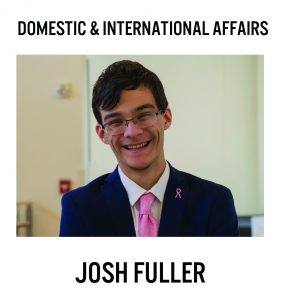 Ever since childhood, police have always been held in high regard. I grew up with a grandfather serving in the police force for 16 years. I remember as a child going to the police department and meeting officers. In more recent years, the public image of the police has shifted. With several incidents of officers overstepping their boundaries, the public has begun to view the police, as a whole, as an evil entity. It breaks my heart to see the police demonized in such a way. Police brutality is an issue that must be confronted, but disrespecting all police officers does not solve the problem.
Ever since childhood, police have always been held in high regard. I grew up with a grandfather serving in the police force for 16 years. I remember as a child going to the police department and meeting officers. In more recent years, the public image of the police has shifted. With several incidents of officers overstepping their boundaries, the public has begun to view the police, as a whole, as an evil entity. It breaks my heart to see the police demonized in such a way. Police brutality is an issue that must be confronted, but disrespecting all police officers does not solve the problem.
First and foremost, I am not here to deny that police brutality is a current social justice issue in the United States. Specifically, white male officers interacting with young black men and then the black man ends up killed and the narrative of racism and power dynamics continues to escalate in the police force.
Throughout the years, there have been multiple killings of minorities by the police — Trayvon Martin, Philando Castile, Jamar Clark, Walter Scott, and sadly these are only a few names. Regardless of belief of innocence, one cannot deny the tragic and pointless loss of countless lives. Part of our justice system is the belief that all are innocent until proven guilty. What makes these incidents all the more devastating is that the individual police officers in these cases acted as judge, jury and executioner without upholding this core belief.
However, this catastrophic pattern does not excuse the stigma currently shrouding police officers. In the United States, violence against police officers has become a normality. According to the National Law Enforcement Officers Memorial Fund, 128 officers lost their lives in the line of duty in 2017. Officers are public servants. They risk their lives daily so that we may sleep better at night. They enforce the laws that give us are rights. It is important to remember that police officers are people that have families too and we can’t judge the entire police force, the frontline of our defense, off the incorrect actions of a subset within. And when violence rises up against officers of the law, officers are trained to deal with that violence. And with acts of murder and homicide at an all time high against police officers, it makes logical sense why officers are so tightly wound. In Montana, a highway patrol officer was killed in a routine traffic stop.The police officer pulled a man over and was shot dead on the scene. This is not an isolated incident but one of the realities that has come to an occupation that until recently was idealized. We can’t hope to redeem police brutality by simply starting to take revenge on all officers in blue.
So what is the solution to this mess? Like many conflicts, there isn’t simply one steadfast answer to it. The first step to progress is for American society to truly understand that violence only breeds more violence and no progress is made. When an officer is killed for malicious reasons, future officers will be on edge and more likely to take more drastic protocol, and this is true in the reverse. An example of this is how Antifa, an organization that claims to “use direct violence to fight against fascists,” and how they operate. The problem is that the methods they use only lead to more violence, particularly against the police. This turns what were once peaceful protests into a brawl scene. The protests in Charlottesville are only one example.
The second realization for our society is that police work constantly to protect the public, not to harm. To correct the current narrative back to its heroic roots. Certainly, there will always be corruption in the public service jobs like any position, but to extend that to all officers discredits the service of the police and shows disrespect to the brave men and women that fight for us every day. Another step in the direction of progress of this issue is to put our respect for the police in action and comply in issues of conflict. When an officer pulls you over, don’t try to be defensive the second they open their mouth and refuse cooperation. Instead, calmly hand over whatever paperwork they need and comply with the questions to eliminate as many factors from the beginning that create the officers to be jumpy. Again, the blame in situations gone wrong is not held by the victim, but by eliminating the abrasive defensive behavior towards cops will lead situations away from escalating. Corrections in the system need to be made. But, for the officers that work tirelessly each day and are now suffering unsafe conditions in a profession that is victim to stereotypes, corrections among the public need to be made as well. Developing a new narrative that pinpoints issues and doesn’t apply the wrongdoings to all populations will be a huge step towards allowing violence to not bloom in our society, especially when safety is the only goal.
